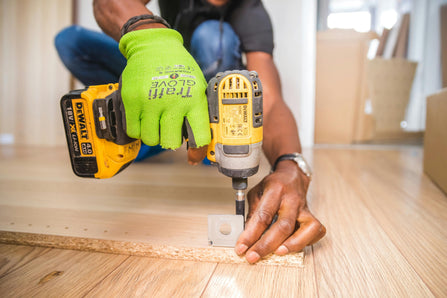The Cost of Chores for Kids | Online Carpets
Posted on by Online Carpets
The Great British Kids Chores Report
In the age of the internet, it can seem like everyone has opinions on the best way to parent. But regardless of how you choose to raise your children, if there’s one thing most parents - and parenting experts - seem to unite on, it’s kids’ chores (even if the kids universally disagree).
And if you don’t believe us, just take a look at the new research we at Online Carpets have conducted. To get a better understanding of the reality of chores for kids across the UK, we surveyed* 500 parents, and can reveal that setting children chores is incredibly common, with nearly 9 in 10 (86%) UK children participating in household chores.
To find out exactly how much British kids are pocketing for each household chore, how parents feel about chores, age-appropriate chores, how to convince your kid to do more around the house, and much more, keep on reading…
Which chores do parents deem age appropriate for kids?
While some experts recommend that children can start chores from around the age of 2, the age they start each chore can differ.
For example, a 2-year-old might be able to help tidy up toys, but you probably wouldn’t equip them with an iron and a growing pile of clothes to tackle.
So, what do British parents deem age-appropriate chores?
Our research found that by the time children reach the age of 11, parents expect them to be doing most household chores, with the exception of cleaning the bathroom, washing clothes, making dinner, and ironing.
The latter of which parents believe is the most senior task, waiting until their kids are teenagers before they think they can handle this chore - 13 years and 2 months old, to be exact.
Household chores aside, we found that most parents wouldn’t ask their children to babysit until they were at least 13 years and 11 months old.
While there is no legal minimum age for babysitting in the UK, parents will remain legally responsible for all their children’s well-being if they leave them with another child under the age of 16. For more guidance on when babysitting is an age-appropriate chore, visit the NSPCC site.
Check out our age appropriate chore list below:

How much is each chore ‘worth’?
When it comes to chores for kids, the vast majority of parents (81%) pay their children for doing them, with 54% of parents saying their children do chores in exchange for pocket money, and the other 27% saying their children get paid depending on what the chore is.
However, around 1 in 5 (19%) kids doing chores don’t get any money at all. On the contrary, our research also found that one-fifth (21%) of parents don’t think children should have to do chores if they aren’t getting paid for them.
While the average pocket money in the UK varies by age, our list of how much parents think each chore is worth might help you to determine how much to give your child:

Regardless of which side of the wallet you sit on, research from the University of Cambridge found that people typically form their money habits by age 7. Once formed, the study concluded that it’s difficult to reverse those habits later in life.
We spoke to the experts at MyPocketSkill - a platform for young people aged 13-24 to earn money - to find out more about why giving your children pocket money in exchange for helping household chores could set them up for financial success in the future.
Matthew Harker, Co-CEO of MyPocketSkill said: "The greatest motivator for learning about money is to earn it yourself.
“It's hard for young people to understand the value of money until you actually start to earn it yourself - and pocket money as payment for household chores is a great start.
“Evidence from our community of young people clearly demonstrates a better understanding of finances and other life skills when money is earned with hands-on experiences - leading to improved financial capability and resilience later in life."
Why should children do chores?
Much like when you were once sitting in a maths class wondering when you were going to use the Pythagorean theorem in the real world, every parent will know the frustration of trying to figure out how to encourage their kids to do chores.
More people in the house means more housework to get through. And housework isn’t something that necessarily comes naturally to us: around 1 in 6 (15%) parents told us their lack of chores as children meant they struggled with household life skills when they first moved out.
Similarly, more than half of British parents (55%) told us they believe not giving children chores is likely to set them up for failure in adulthood.
But what are the exact reasons the majority of parents in the UK set their kids chores? Take a look below:

And if you do manage to get your child to do their set chores, you might often find they’re completed haphazardly in a rush to do much more important things, like going out with friends.
Our survey found that two-thirds (63%) of parents make their children complete their chores and homework before they’re allowed to play, which may encourage your child to rush through tasks to get to their ‘fun’ time. But exactly how much time do kids’ chores take up each week?
Our survey found that the average kid in the UK spends around 1 hour and 24 minutes each week completing chores. Or around 12 minutes each day. Comparatively, research from Eflorist found that mums in the UK spend about an hour and 24 minutes each day doing housework.
If you find yourself in the same boat as the 55% of British parents who wish they could get their child to do more chores, look no further.
We’ve teamed up with Georgina Sturmer, Counsellor, MBACP who explains how you can encourage your children to help out around the house more.
Georgina says: “As parents, it can be hard to strike the right balance.
“To set and maintain standards for behaviour, while allowing our children to be children, and to develop their creativity and autonomy.
“Household chores might seem unappealing, but they offer us a useful opportunity.
“To set standards for our children, to show them that they are part of the family unit, to demonstrate that hard work and participation are an important part of life, and - if we choose to do so - to link them with some kind of acknowledgement or reward.
“When children participate in household chores, they learn a sense of responsibility and diligence.”
However, as many parents will know, our children would sometimes rather go kicking and screaming than having to do something they’re not particularly keen on. In fact, our research found that over two-fifths (41%) of parents and children in the UK argue about chores.
So, what do you do when arguments ensue? Georgina gives us her best advice:
Set realistic and age-appropriate expectations
Consider working with your children to develop a shared contract or list of what is expected from them.
As well as the task itself, the list could also be specific about when the task should be done, and how long the task should take.
Children benefit from structure and routine, and this might also include setting a system for rewarding their work.
Role model your own behaviour
Make sure that the children see all the members of the household taking on an appropriate share of the work.
Once boundaries have been set, keep an eye on what happen
If the chores don’t get done, try to stay firm but calm.
It’s important that our children know that they need to adhere to the expectations that have been set.
But it’s also important to de-escalate any tension and to try to avoid a shouting match or conflict.
Make it fun
Turn off your devices and do it all together.
Take it as a chance to chat and let off steam so that it feels like part of family life, rather than a punishment.
Where in the UK are the most kids doing chores?
It’s not only dialects and accents that vary across the UK’s regions - apparently, the number of kids doing chores does, too.
That being said, it’s not such a clear North-South divide as some other areas of life. In fact, it’s quite varied.
Our research reveals that kids living in the West Midlands are the most likely to do household chores, with over 9 in 10 (93%) participating in them.. Following the West Midlands is the North East (90%) and Northern Ireland (88%).
When it comes to the places in the UK where the least amount of kids are doing chores, Scotland and Wales take the top spots. Just 78% of children in Scotland help out around the house, and 79% in Wales.

However, it seems it doesn’t matter where you come from or how rich you are on the whole, with 81% of ALL parents thinking that even the most privileged of children should participate in chores.
Need inspiration for your kids' chores?
It’s no secret that kids thrive on variety, so if you’re finding the chores you set repetitive, why not check out some of our other cleaning blogs for inspiration?
- Best ways to clean laminate flooring
- How to remove chocolate stains from carpets (we’ve got a feeling this one will come in handy)
- Effective ways to clean pet mess from floors


